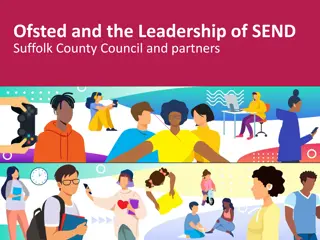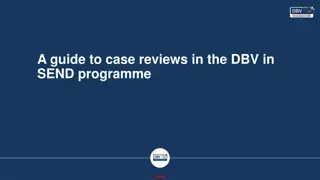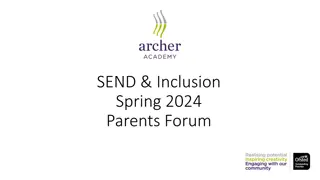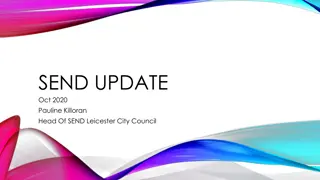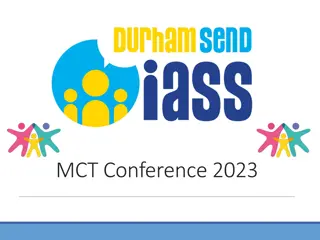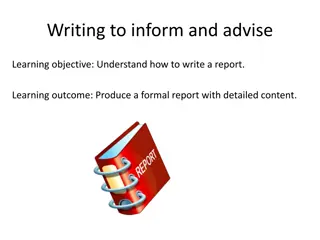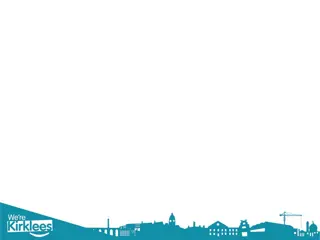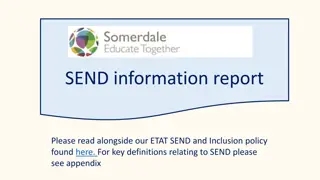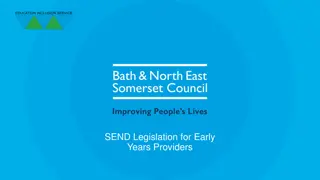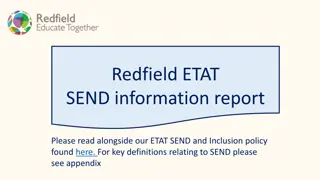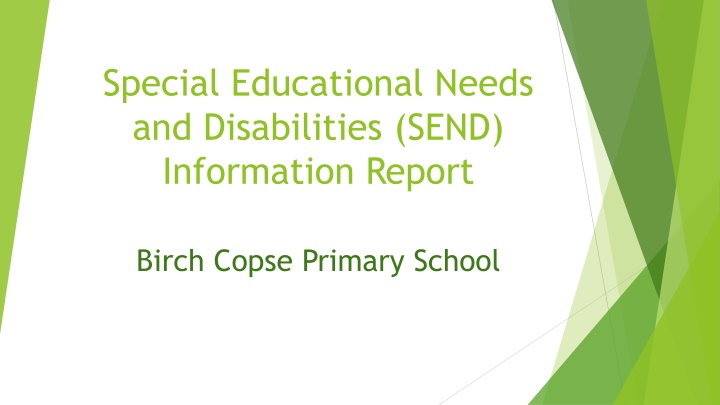
Supporting Special Educational Needs at Birch Copse Primary School
Birch Copse Primary School is dedicated to providing a safe, respectful, and supportive learning environment for all children, including those with Special Educational Needs and Disabilities (SEND). The school aims to recognize and support pupils with SEND, collaborate with parents and carers, and empower staff to work effectively with these students. The role of the Special Educational Needs Coordinator (SENCo) is essential in identifying, monitoring, and providing support for children with additional needs. The SENCo works closely with teachers, creates personalized plans, and liaises with outside agencies to ensure all students can achieve their potential.
Download Presentation

Please find below an Image/Link to download the presentation.
The content on the website is provided AS IS for your information and personal use only. It may not be sold, licensed, or shared on other websites without obtaining consent from the author. If you encounter any issues during the download, it is possible that the publisher has removed the file from their server.
You are allowed to download the files provided on this website for personal or commercial use, subject to the condition that they are used lawfully. All files are the property of their respective owners.
The content on the website is provided AS IS for your information and personal use only. It may not be sold, licensed, or shared on other websites without obtaining consent from the author.
E N D
Presentation Transcript
Special Educational Needs and Disabilities (SEND) Information Report Birch Copse Primary School
Together we plant the seeds for success Birch Copse aims to provide a safe, respectful and supportive learning environment that enables learners to feel valued and reach their potential within a happy, healthy and caring community. All children are encouraged to enjoy learning and experience a creative and stimulating curriculum to help them become confident and independent learners. We aim to create an environment where all achievements and talents are recognised including high personal standards and personal and academic achievements so that EVERY child can achieve.
At Birch Copse we: identify and support pupils who have special educational needs or a disability (SEND) work closely with parents and carers to provide support and advice for children and their families understand the importance of personal academic achievements for children as well as supporting their emotional and social skills work collaboratively to ensure that all staff feel supported and empowered to work with pupils with SEND encourage the aspirations of and have high expectations for all pupils with SEND in every area of school life
The role of the Special Educational Needs Co- ordinator (SENCo) at Birch Copse The SENCo, Miss Ellis, is a member of the Senior Leadership Team. Her role includes: Recognising pupils with SEND and additional needs and monitoring their learning and support Supporting and line managing Learning Support Assistants who work 1:1 with specific children Working with teachers to create Support and Achievement Plans (SAPs) and Graduated Approach Plans (GAPs) to support small steps of learning. Attend SAP meetings with teachers Supporting teachers to differentiate the curriculum to suit the needs of individuals Being aware of current SEND thinking and updating staff Making referrals to specialist outside agencies such as CAMHS, Emotional Health Academy and Speech and Language
Special Educational Needs Co-ordinator (SENCo) role (cont.) Gathering evidence and making applications for additional support for children with specific needs such as to specialist funding streams, assessment for an Education Health Care Plan and other short term funding opportunities Liaising with outside agencies such as the Educational Psychology Service, Speech and Language Therapy, Family Support Worker and other specialist services Assessing children to identify specific areas of need in order to provide appropriate and individualised planning and intervention Training support staff to run specific interventions Overseeing the implementation of Education Health Care Plans (EHCPs) and monitoring the progress of the children through SAPs and Annual Reviews Creating and maintaining supportive and trusting relationships with parents to ensure that they play a collaborative role in their child s education Ensuring records on individual pupils needs are in good order and up to date Planning and running intervention groups such as peer mediation and social skills Reporting to the SEND governor
The definition of Special Needs A child of compulsory school age or a young person has a learning difficulty or disability if he or she: Has a significantly greater difficulty in learning than the majority of others of the same age Has a disability which prevents him or her from making use of facilities of a kind generally provided for others of the same age in mainstream schools or mainstream post 16 institutions. (Code of Practice 2014)
Assessing, identifying and supporting pupil needs Ongoing assessment takes place within the classroom, as part of good classroom practice. Teachers have an excellent knowledge of the children in their class and always liaise with the SENCo if they have any concerns about a child In addition, Salford reading tests are carried out throughout the year which help us to identify any potential difficulties The Hodder spelling test is used if a particular spelling concern is raised Once a need has been identified we have a number of interventions which we can put in place to support your child such as Precision Teaching, Word Shark, Lego therapy, social skills groups and Sensory Circuits
If you think that your child might have a special educational need In the first instance speak to your child s teacher about your concerns Once you have spoken to your child s class teacher they may then speak to the SENCo in order to discuss any additional support that your child may require It may also be appropriate for you to meet with the SENCo to further discuss your concerns Following discussion, if appropriate, additional support will be put in place in the classroom. This support will be monitored and if further support is required this will be discussed with you and formalised through a Graduated Approach Plan (GAP) or a Success and Achievement Plan (SAP)
GAP Graduated Approach Plan (GAP) It is sometimes necessary for a short term plan to be put in place for a child. This may be because teaching staff or parents have raised concerns about a child s progress in learning or their emotional needs The short term plan will help with setting learning outcomes, monitoring and evidence gathering and may lead to the child being formally recognised as having a specific educational need The interventions put in place through a GAP can result in the child making enough progress to reach their targets, meaning that a GAP is no longer required For other pupils this will help us to identify a more significant need and they will be moved onto a SAP
SAP Support and Achievement Plan (SAP) A SAP outlines your child s strengths and difficulties and sets specific outcomes for your child to work towards These are set in consultation by school staff and parents/carers The outcomes are specific to the areas of need identified and are designed to be worked on over a term. They are reviewed and updated three times a year A SAP can be used towards evidence if school decides to apply for additional funding such as an EHCP
ECHP Education Health and Care Plan (EHCP) Some children may require significant support within the mainstream setting over and above that which can be met from within normal school resources. In cases such as these school and/or parents/carers can apply to the Local Authority for an Assessment of the child s Education Health and Care Needs If the Local Authority agree to assess, this process involves gathering information from all parties involved in supporting the child, including parents/carers and the child themselves Following the assessment of needs the Local Authority will decide the level of additional support required which will then be formalised through an EHCP The EHCP is a detailed document which sets out in depth the needs of the child and the provision required to meet those needs
Supporting your childs learning needs A key aim for us is that all children are fully included in all aspects of school life. We look at a child s individual needs and plan provision and support accordingly within the classroom. As part of good classroom practice, appropriate differentiation of learning activities is always provided. In addition other support arrangements could be, providing visual prompts, considering seating arrangements, minimising instructions, implementing movement breaks or giving a child time to consolidate their learning with an adult after the lesson Some children require even more focused support, examples are pre- teaching, targeted individual teaching, individual and small group work
Supporting your childs emotional needs At Birch Copse we pride ourselves in supporting the emotional needs of our children and families We have an Emotional Support Assistant (ESA), Tracey McCrossan, who can work with children to help them understand and process their emotions and give them strategies to help them manage their feelings Tracey McCrossan is also our Family Liaison Officer and she supports families with many aspects of parenting/caring for children both emotionally and practically Sue Rose works with the SEN team for two days a week. She assists with admin and also runs small social skills groups Tracey McCrossan Sue Rose
Outside agencies We have a number of outside agencies who support us in school, these include: The Educational Psychology Service (EPS) who offer support to both parents and school. They can they do this through observations and assessments of the child and discussion with school staff and parents/carers. They provide a detailed report with recommendations of support Speech and Language Therapists (SALT) who assess and monitor children s progress, provide training and support to staff to enable them to deliver specific speech and language programmes effectively The Therapeutic Thinking Support Team (TTST) who offer advice and support if a child is finding school particularly challenging and is struggling to manage their behaviour The Emotional Health Academy can support children and families if the child is experiencing moderate mental health difficulties The Community School Nurse can help with bedwetting, sleeping and eating concerns. We can refer to the Child and Adolescent Mental Health Service (CAMHS) if the child has persistent or more severe mental health difficulties. CAMHS is the referral and diagnosis route for Autism and ADHD Parental permission is always sought for referral to outside agencies
Further information For further information about SEND provision at Birch Copse please follow the link below to the local offer. Birch Copse Primary School | West Berkshire Directory



